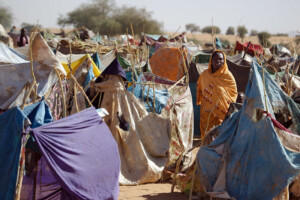Minister of Education has become ‘an obstacle to change’ say Sudan teachers
As part of rolling strikes by Sudanese teachers against low wages and poor working conditions, the Sudanese Teachers Committee has announced a protest to demand the Minister of Education to step down on Tuesday.
 Sudanese Teachers Committee logo (File photo)
Sudanese Teachers Committee logo (File photo)
As part of rolling strikes by Sudanese teachers against low wages and poor working conditions, the Sudanese Teachers Committee has announced a protest to demand the Minister of Education to step down on Tuesday.
The acting Minister of Education has become “an obstacle to reaching desired changes” for teachers in Sudan, said Duriya Babiker, a member of the committee. Earlier this month, the Service Affairs Bureau announced an increase in teachers’ wages by six per cent, only a “partial response” by the authorities to stop the strike, according to Babikir.
She explained that the minister is supposed to stand with the teachers’ demands and defend them, and not threaten to transfer or dismiss them.
Strikes on Tuesday and Thursday last week were 100 per cent successful, the committee announced on Thursday. 12,000 schools were closed across the country. In White Nile state, 100 per cent of basic schools, 97 per cent of middle schools, and 98 per cent of secondary schools participated in the strike on Thursday.
The effect of the closure of the schools “was clear and tangible” in Khartoum, as the streets were free of the usual congestion, the report said. The committee said that the Red Sea state authorities suspended classes “on the pretext of bad weather.” In South Darfur, classes were suspended for an indefinite period.
Arbitrary transfer
Huweida El Amin, spokesperson for the White Nile state Teachers’ Committee, told Radio Dabanga that the education department in the state threatened the striking teachers with arbitrary transfer.
Angry teachers staged a protest vigil in front of the Ministry of Education in Ed Damer on Thursday, because two striking members of the River Nile Teachers Committee were transferred to remote areas in the state.
Mosab Abdeljalil, member of the teachers’ committee, told Radio Dabanga that the state Education Ministry transferred teachers Abdallah Eisa and Ghada Abdelrahim to remote areas. He said that the total number of teachers transferred amounts to 19 since the strikes began.
The protesting teachers in Ed Damer submitted a memorandum rejecting the arbitrary transfers and demanding to know the reason why they were necessary. They also threatened to expand the strike days if all those who were arbitrarily transferred are not returned to their previous positions.
Schools reopened
The Ministry of Education in South Darfur partially opened schools again on Sunday, after schools were closed last week due to “insecurity in the state.”
The closures followed several student demonstrations against increased school fees and the inflated costs of living in general. Students of a number of schools in Ed Damazin, capital of Blue Nile region, also demonstrated against increases in tuition fees last week. According to the students, school fees have doubled since last year, now at SDG10,000.
Teachers in South Darfur expressed their surprise at the Ministry of Education’s decision to freeze studies indefinitely for security reasons last week.
Bahreldin Abdallah, secretary of the South Darfur Teachers Committee told Radio Dabanga that the ministry’s decision to close the schools was “unwise. This suspension will harm students’ abilities to achieve,” because the school year started later in South Darfur than the rest of Sudan.
Omar Adam, Director of the South Darfur Ministry of Education, said in a press statement on Saturday that the decision to open the schools for the exam classes was taken because the students urgently need to prepare for their final school exams.
Tajeldin Bahreldin, member of the South Darfur branch of the National Umma Party, told Radio Dabanga that “the closure of schools is inseparable from the teachers’ strike.” He called on the authorities to address teaching conditions so that classes can resume.
Lawyer Adam Sherif also told Radio Dabanga that the South Darfur state authorities’ decision to suspend studies was and “illegal and unrealistic” attempt to circumvent the teachers’ strike.
He explained that the decision is not the prerogative of the Director of the Ministry of Education but of the state security committee. The lawyer said that there is no threat to security, pointing out that a number of secondary school students staged limited demonstrations without any damage to property.
In September, UNICEF and Save the Children called on the Sudanese government to keep “schools open for the entire academic year, ensure no schools are occupied by armed actors, and facilitate additional alternative education opportunities to make sure no child is left behind.”











 and then
and then